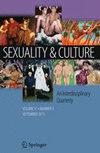“Far from the Space of Tolerance”: Hungary and the Biopolitical Geotemporality of Postsocialist Homophobia
IF 1.5
Q2 SOCIAL SCIENCES, INTERDISCIPLINARY
Sexuality & Culture-An Interdisciplinary Journal
Pub Date : 2023-10-11
DOI:10.1007/s12119-023-10155-2
引用次数: 0
Abstract
Abstract Sexuality has long been central to ethnographic constructions of exotic difference, an index critically demarcating the borders of European Modernity and its negative and positive Others, and underpinning both extra-European colonial domination and modern biopolitical regimes of subjectivity, citizenship, and society. Representations of Eastern European sexuality, however, were also crucial to both Western and Eastern imaginings of modern “European” selves, politics, and societies, and their boundaries of belonging. Yet while recent scholarship has drawn attention to reemerging European orientalisms and sexuality’s salience in postsocialist politics, particularly in relation to recent postsocialist homophobias, little scholarly attention has been paid to the significance of these histories of European sexual difference for the biopolitical character of current borders of postsocialist difference. In this article I combine postcolonial theories of sexuality, geographies of European belonging, and postsocialist studies of sexual politics to analyze popular, political, and scholarly discourses surrounding sexual politics and homophobia in Hungary. Melding historical debates about Hungarian belonging, discursive analysis, and ethnographic fieldwork, I argue that dominant interpretations of these events constitute postsocialist homophobia as a particularly consequential “problem” reinscribing deeply rooted, and profoundly biopolitical, borders between Europe’s East and West. These readings not only naturalize an imagined West as a space of proper sexual citizenship and tolerance, masking its persistent heteronormativity; they also render Hungary a time–space of complex, ambiguous sexual-political resistance, essentializing its inhabitants as inevitable sexual others of Western Modernity: for some failures of proper sexual citizenship; for others avatars of alternative, sexually-traditional Europeanness.“远离宽容的空间”:匈牙利和后社会主义同性恋恐惧症的生物政治地理时代性
长期以来,性一直是异域差异的民族志建构的核心,是批判性地划分欧洲现代性及其消极和积极他者边界的指标,是欧洲以外殖民统治和主体性、公民身份和社会的现代生物政治制度的基础。然而,东欧性行为的表现对于西方和东方对现代“欧洲人”自我、政治和社会及其归属边界的想象也至关重要。然而,尽管最近的学术研究引起了人们对后社会主义政治中重新出现的欧洲东方主义和性的突出性的关注,特别是与最近的后社会主义同性恋恐惧症有关,但很少有学术关注这些欧洲性别差异历史对当前后社会主义差异边界的生物政治特征的重要性。在这篇文章中,我将性的后殖民理论、欧洲归属地理学和性政治的后社会主义研究结合起来,分析匈牙利围绕性政治和同性恋恐惧症的流行、政治和学术话语。结合历史上关于匈牙利归属的争论、话语分析和民族志田野调查,我认为对这些事件的主流解释构成了后社会主义的同性恋恐惧症,它是一个特别重要的“问题”,重新刻划了欧洲东西方之间根深蒂固的、深刻的生物政治边界。这些解读不仅将想象中的西方自然化为一个适当的性公民和宽容的空间,掩盖了其持久的异性恋规范;他们还使匈牙利成为一个复杂的、模棱两可的性政治抵抗的时空,将其居民本质化为西方现代性中不可避免的性他人:因为一些适当的性公民的失败;对另一些人来说,这是另类的、性传统的欧洲特征的化身。
本文章由计算机程序翻译,如有差异,请以英文原文为准。
求助全文
约1分钟内获得全文
求助全文
来源期刊

Sexuality & Culture-An Interdisciplinary Journal
SOCIAL SCIENCES, INTERDISCIPLINARY-
CiteScore
3.00
自引率
13.30%
发文量
103
期刊介绍:
Sexuality & Culture is an international interdisciplinary forum for analysis of ethical, cultural, psychological, social, and political issues related to sexual relationships and sexual behavior. These issues include, but are not limited to: sexual consent and sexual responsibility; sexual harassment and freedom of speech and association; sexual privacy; censorship and pornography; impact of film/literature on sexual relationships; and university and governmental regulation of intimate relationships, such as interracial relationships and student-professor relationships.
The journal publishes peer-reviewed original theoretical articles based on logical argumentation and on literature review and empirical articles that describe the results of experiments or surveys on the ethical, cultural, psychological, social, or political implications of sexual behavior. The journal also publishes book reviews, critical reviews of published books or other media.
 求助内容:
求助内容: 应助结果提醒方式:
应助结果提醒方式:


